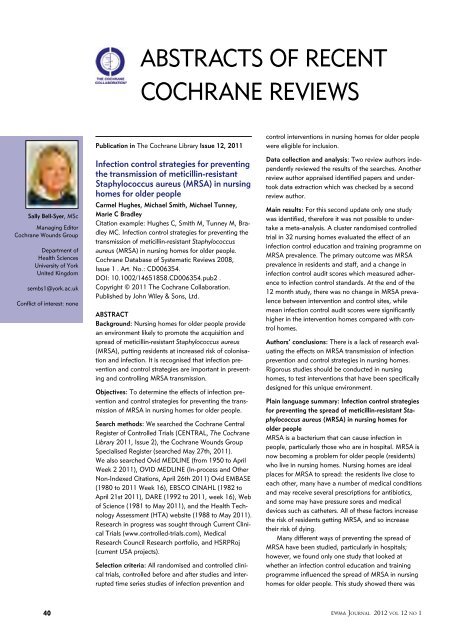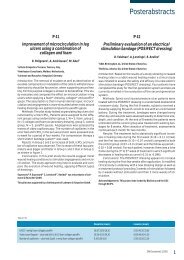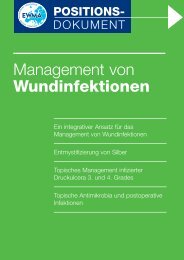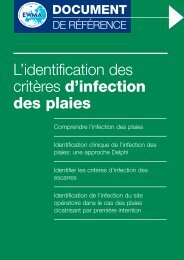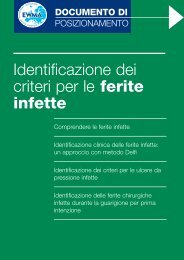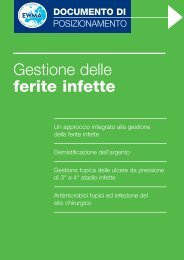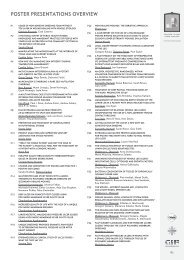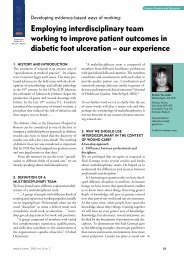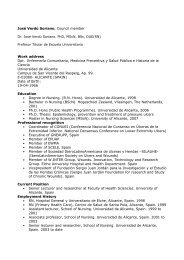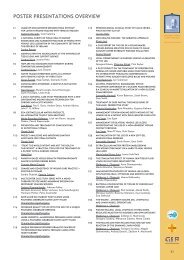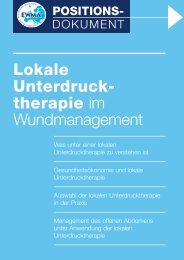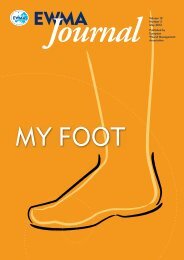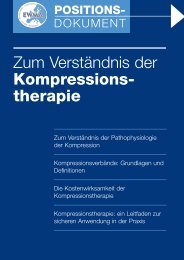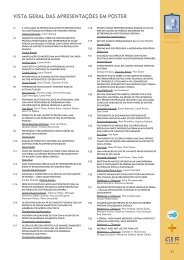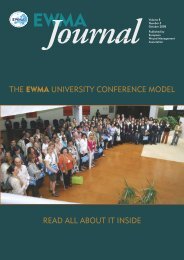FOCUS ON THE AUSTRIAN W UND ASSOCIATION - EWMA
FOCUS ON THE AUSTRIAN W UND ASSOCIATION - EWMA
FOCUS ON THE AUSTRIAN W UND ASSOCIATION - EWMA
- TAGS
- focus
- austrian
- association
- ewma
- ewma.org
You also want an ePaper? Increase the reach of your titles
YUMPU automatically turns print PDFs into web optimized ePapers that Google loves.
Sally Bell-Syer, MSc<br />
Managing Editor<br />
Cochrane Wounds Group<br />
Department of<br />
Health Sciences<br />
University of York<br />
United Kingdom<br />
sembs1@york.ac.uk<br />
Conflict of interest: none<br />
40<br />
ABSTRACTS OF RECENT<br />
COCHRANE REVIEWS<br />
Publication in The Cochrane Library Issue 12, 2011<br />
Infection control strategies for preventing<br />
the transmission of meticillin-resistant<br />
Staphylococcus aureus (MRSA) in nursing<br />
homes for older people<br />
Carmel Hughes, Michael Smith, Michael Tunney,<br />
Marie C Bradley<br />
Citation example: Hughes C, Smith M, Tunney M, Bradley<br />
MC. Infection control strategies for preventing the<br />
transmission of meticillin-resistant Staphylococcus<br />
aureus (MRSA) in nursing homes for older people.<br />
Cochrane Database of Systematic Reviews 2008,<br />
Issue 1 . Art. No.: CD006354.<br />
DOI: 10.1002/14651858.CD006354.pub2 .<br />
Copyright © 2011 The Cochrane Collaboration.<br />
Published by John Wiley & Sons, Ltd.<br />
ABSTRACT<br />
Background: Nursing homes for older people provide<br />
an environment likely to promote the acquisition and<br />
spread of meticillin-resistant Staphylococcus aureus<br />
(MRSA), putting residents at increased risk of colonisation<br />
and infection. It is recognised that infection prevention<br />
and control strategies are important in preventing<br />
and controlling MRSA transmission.<br />
Objectives: To determine the effects of infection prevention<br />
and control strategies for preventing the transmission<br />
of MRSA in nursing homes for older people.<br />
Search methods: We searched the Cochrane Central<br />
Register of Controlled Trials (CENTRAL, The Cochrane<br />
Library 2011, Issue 2), the Cochrane Wounds Group<br />
Specialised Register (searched May 27th, 2011).<br />
We also searched Ovid MEDLINE (from 1950 to April<br />
Week 2 2011), OVID MEDLINE (In-process and Other<br />
Non-Indexed Citations, April 26th 2011) Ovid EMBASE<br />
(1980 to 2011 Week 16), EBSCO CINAHL (1982 to<br />
April 21st 2011), DARE (1992 to 2011, week 16), Web<br />
of Science (1981 to May 2011), and the Health Technology<br />
Assessment (HTA) website (1988 to May 2011).<br />
Research in progress was sought through Current Clinical<br />
Trials (www.controlled-trials.com), Medical<br />
Research Council Research portfolio, and HSRPRoj<br />
(current USA projects).<br />
Selection criteria: All randomised and controlled clinical<br />
trials, controlled before and after studies and interrupted<br />
time series studies of infection prevention and<br />
control interventions in nursing homes for older people<br />
were eligible for inclusion.<br />
Data collection and analysis: Two review authors independently<br />
reviewed the results of the searches. Another<br />
review author appraised identified papers and undertook<br />
data extraction which was checked by a second<br />
review author.<br />
Main results: For this second update only one study<br />
was identified, therefore it was not possible to undertake<br />
a meta-analysis. A cluster randomised controlled<br />
trial in 32 nursing homes evaluated the effect of an<br />
infection control education and training programme on<br />
MRSA prevalence. The primary outcome was MRSA<br />
prevalence in residents and staff, and a change in<br />
infection control audit scores which measured adherence<br />
to infection control standards. At the end of the<br />
12 month study, there was no change in MRSA prevalence<br />
between intervention and control sites, while<br />
mean infection control audit scores were significantly<br />
higher in the intervention homes compared with control<br />
homes.<br />
Authors’ conclusions: There is a lack of research evaluating<br />
the effects on MRSA transmission of infection<br />
prevention and control strategies in nursing homes.<br />
Rigorous studies should be conducted in nursing<br />
homes, to test interventions that have been specifically<br />
designed for this unique environment.<br />
Plain language summary: Infection control strategies<br />
for preventing the spread of meticillin-resistant Staphylococcus<br />
aureus (MRSA) in nursing homes for<br />
older people<br />
MRSA is a bacterium that can cause infection in<br />
people, particularly those who are in hospital. MRSA is<br />
now becoming a problem for older people (residents)<br />
who live in nursing homes. Nursing homes are ideal<br />
places for MRSA to spread: the residents live close to<br />
each other, many have a number of medical conditions<br />
and may receive several prescriptions for antibiotics,<br />
and some may have pressure sores and medical<br />
devices such as catheters. All of these factors increase<br />
the risk of residents getting MRSA, and so increase<br />
their risk of dying.<br />
Many different ways of preventing the spread of<br />
MRSA have been studied, particularly in hospitals;<br />
however, we found only one study that looked at<br />
whether an infection control education and training<br />
programme influenced the spread of MRSA in nursing<br />
homes for older people. This study showed there was<br />
<strong>EWMA</strong> Journal 2012 vol 12 no 1


